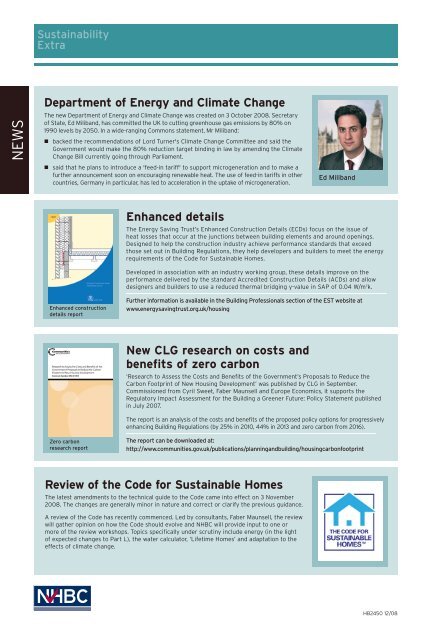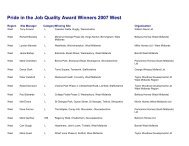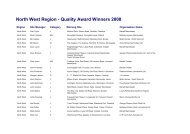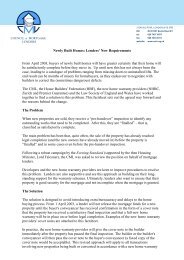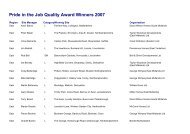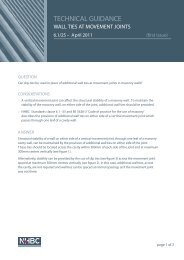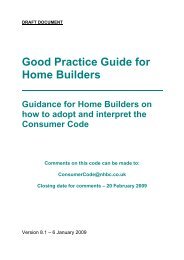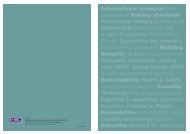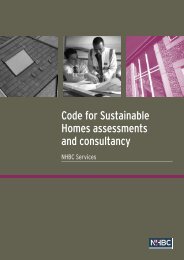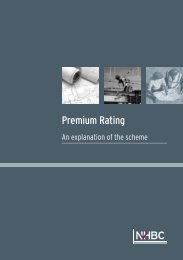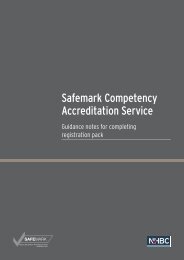Standards Extra - NHBC Home
Standards Extra - NHBC Home
Standards Extra - NHBC Home
Create successful ePaper yourself
Turn your PDF publications into a flip-book with our unique Google optimized e-Paper software.
Sustainability<br />
<strong>Extra</strong><br />
NEWS<br />
Department of Energy and Climate Change<br />
The new Department of Energy and Climate Change was created on 3 October 2008. Secretary<br />
of State, Ed Miliband, has committed the UK to cutting greenhouse gas emissions by 80% on<br />
1990 levels by 2050. In a wide-ranging Commons statement, Mr Miliband:<br />
backed the recommendations of Lord Turner's Climate Change Committee and said the<br />
Government would make the 80% reduction target binding in law by amending the Climate<br />
Change Bill currently going through Parliament.<br />
said that he plans to introduce a 'feed-in tariff' to support microgeneration and to make a<br />
further announcement soon on encouraging renewable heat. The use of feed-in tariffs in other<br />
countries, Germany in particular, has led to acceleration in the uptake of microgeneration.<br />
Ed Miliband<br />
Enhanced details<br />
The Energy Saving Trust’s Enhanced Construction Details (ECDs) focus on the issue of<br />
heat losses that occur at the junctions between building elements and around openings.<br />
Designed to help the construction industry achieve performance standards that exceed<br />
those set out in Building Regulations, they help developers and builders to meet the energy<br />
requirements of the Code for Sustainable <strong>Home</strong>s.<br />
Developed in association with an industry working group, these details improve on the<br />
performance delivered by the standard Accredited Construction Details (ACDs) and allow<br />
designers and builders to use a reduced thermal bridging y-value in SAP of 0.04 W/m 2 k.<br />
Enhanced construction<br />
details report<br />
Further information is available in the Building Professionals section of the EST website at<br />
www.energysavingtrust.org.uk/housing<br />
New CLG research on costs and<br />
benefits of zero carbon<br />
‘Research to Assess the Costs and Benefits of the Government’s Proposals to Reduce the<br />
Carbon Footprint of New Housing Development’ was published by CLG in September.<br />
Commissioned from Cyril Sweet, Faber Maunsell and Europe Economics, it supports the<br />
Regulatory Impact Assessment for the Building a Greener Future: Policy Statement published<br />
in July 2007.<br />
The report is an analysis of the costs and benefits of the proposed policy options for progressively<br />
enhancing Building Regulations (by 25% in 2010, 44% in 2013 and zero carbon from 2016).<br />
Zero carbon<br />
research report<br />
The report can be downloaded at:<br />
http://www.communities.gov.uk/publications/planningandbuilding/housingcarbonfootprint<br />
Review of the Code for Sustainable <strong>Home</strong>s<br />
The latest amendments to the technical guide to the Code came into effect on 3 November<br />
2008. The changes are generally minor in nature and correct or clarify the previous guidance.<br />
A review of the Code has recently commenced. Led by consultants, Faber Maunsell, the review<br />
will gather opinion on how the Code should evolve and <strong>NHBC</strong> will provide input to one or<br />
more of the review workshops. Topics specifically under scrutiny include energy (in the light<br />
of expected changes to Part L), the water calculator, ‘Lifetime <strong>Home</strong>s’ and adaptation to the<br />
effects of climate change.<br />
HB2450 12/08


